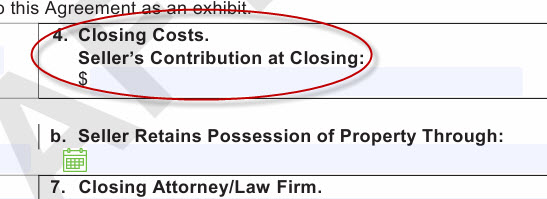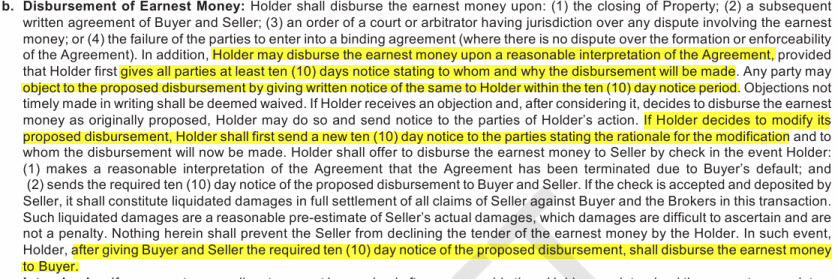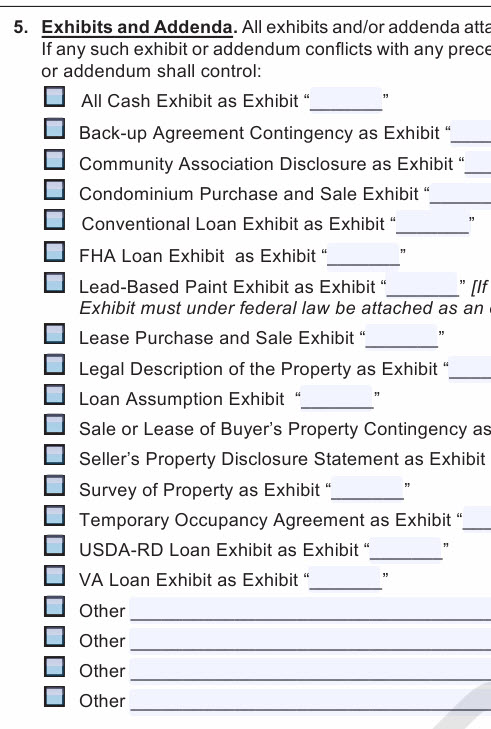|
Page 1, 4. Closing
Costs. Seller's Contributions at Closing

This is where you can
have the seller pay some of the closing costs.
The contract is written so that the buyer is responsible for all
the costs of the transaction except for the realtor commissions
and some of the transfer taxes.
You have to state a specific
amount. If closing costs are less than that amount, the
buyer doesn't get any refund so you should know upfront from you
lender how much to expect in closing costs. Closing costs
include discount points that are used to lower the interest
rate.
The seller doesn't
actually write a separate check for these items. They are deducted
from their side of the balance sheet which results in them
walking away with less.
The seller is mainly concerned about
their bottom line, the amount that they walk away with.
Don't get too bogged down on the specifics of who pays what.
All that really matters is the net amount. The seller is
just going to add up all of the costs that they need to pay and
look at what they are left with.
An offer of $400,000 with the
seller paying $5,000 in closing costs is the same to the seller
as an offer for $395,000 with them paying zero closing costs.
Therefore, if you really
think it through, the buyer is paying for everything one way or
another. Having the seller pay closing costs just means
that the price will be higher and therefore the amount financed
will be higher and therefore the Buyer will in fact be financing
those closing costs over the length of the mortgage.
If you ask the seller to pay
some of the closing costs, that leaves more money in the pocket
of the buyer. But the Buyer has a higher monthly payment.
Page 1, 5.b.
Possession After Closing

The best situation for the
Buyer is to take possession immediately after closing. Just
before the closing, you do a final walk-thru with the property empty.
This allows you to know exactly what you are getting before you sign off on
all the paperwork. If there was any damage done during the
move out process, you can deal with it at the closing or refuse
to close.
In Georgia, it is customary
in many cases to do the closing and then allow the seller up to 48
hours to move out before handing over possession to the Buyer. The seller
doesn't want to have all of their possessions on a moving truck
and then find out at the last minute something went wrong with
the buyer's financing.
The negative aspect of
giving the seller a few days to move out after the closing is
that the buyer takes the risk that damage might occur during the
move out and then they aren't in much of a position to do anything
about it.
If it's something that the
seller is insisting on to make the deal happen, then you want to
make sure you include the
"Temporary Occupancy Agreement" that
spells out the details of who is responsible for certain things.
Page 1, 8. Earnest
Money

Earnest money is the deposit
you put up front showing that you are "earnest". It's the
amount of money that you will forfeit if you default on the
contract.
Usually 1% of the
purchase price is a reasonable amount. So on a $300,000 home,
earnest money would be around $3000.
The higher your earnest
money, the stronger your offer might look. If you just put
up $500 earnest money, that won't give the seller much
confidence. That means that if you walk away they only
would get $500 for having their home off the market during that
time.
If the closing date will be
more than 45 days in the future, the seller will usually want
more earnest money. This is because the seller will be
losing a lot of potential buyers during that time when their
home will be off the market.
Earnest money isn't deposited
until after the binding agreement date. It's usually held
in the buyer agent's broker's escrow account. The buyer
does not get interest on it.
Page 1 9. Inspection
and Due Diligence

The Due Diligence Period is
the time period during which the
Buyer can do any inspections or research to decide whether they
want to actually buy the property. It starts on the
Binding Agreement Date.
Before the end of the Due
Diligence Period, the Buyer can try to negotiate an "Amendment
to Address Concerns". This is where you can request
the seller to fix certain items before closing or maybe adjust
the purchase price or seller paid closing costs in lieu of
repairs. Or the Buyer can decide to terminate the contract
by sending
a
Termination and Release Notification to the seller before the end of the Due
Diligence Period.
The days of the Due Diligence
Period are full days and it ends at midnight of the last day.
Therefore, a contract signed on Monday at 3pm with a two day due
diligence period would give the buyer until midnight on
Wednesday.
The length of the Due
Diligence Period is negotiable. A usual compromise is
between 7-14 days.
Remember, the seller doesn't
really have a solid contract until this period is over because
the Buyer can terminate for any or no reason at all. So
trying to get a 21 day due diligence period is going to be very
difficult.
Page 1, 12.
Time Limit of Offer

You can try to convey some
urgency by putting a time limit on the offer. Then for a
valid binding contract, the seller needs to sign off on everything
before that time limit.
If for some reason the seller
sends back the signed contract but it's a few minutes past the
time limit, then you don't have a binding contract. The buyer has to change that time limit of
offer, initial, and send it back to the seller for their
initials at the changed time limit of offer. You don't
have a binding agreement until the seller sends it back again.
This means that there's a chance that another offer can come in
and mess things up for you.
So be careful. Trying to
quickly bind down a home by putting in a really short time limit
of offer can sometimes backfire.
Page 2, B. 1.
Warranty

The title search is done by
the closing attorney. They usually wait until after the
due diligence period is over because it costs them money to hire
someone to do the title search.
Title issues are fairly rare
but once in a while there are issues with paid off mortgages that
haven't been recorded as satisfied or other technical problems.
The title search finds any
liens attached to the home. Sometimes an HOA might have a
lien for unpaid dues. Any of these items have to be taken
care of by the seller before title can be transferred.
Page 2, 3. Method of
Payment

Just about every closing
attorney requires the funds to be wired to their escrow account
before closing. Cashiers checks aren't used anymore due to
problems that have occurred in the past with fraud.
If you wire too little, usually a personal check for
amounts less than $500 will be accepted.
If you wire too much money,
the closing attorney cuts you a check for the overage at
closing.
Wires aren't immediate.
They sometimes can take several hours to go through so you need
to plan accordingly.
Page 2, 4.
Closing Costs and Prorations


Unused Seller's Monetary
Contributions remain with the seller so make sure you don't ask
for more closing costs than you'll be able to use.
Many times the property
tax prorations have to be based on last year's tax bill because
the tax bill for the current year isn't available at the time of
closing. All parties agree
that if the actual tax bill is different, both parties will
correct the prorations accordingly.
Remember that taxes are
paid for the entire calendar year sometime in October. So
if you close in August, the seller will pay you the property
taxes for January thru August and then you will pay the entire
tax bill for the year in October. If you have a mortgage
that escrows for taxes and insurance, you will be required to
pre-fund that escrow account so that there will be enough to pay
the taxes come October.
Again, there aren't
separate checks for these specific items. It's all
balanced out on the closing sheet with credits and debits.
Page 2. 5.a. Right to
Extend Closing Date

If your lender can't get
the loan closed in time you can unilaterally extend the closing
date by up to 8 days. But the delay can't have been due to
something that the Buyer did or didn't do.
If the seller needs more
time to clear something on the title, they also can unilaterally
extend the closing date.
Since all parties are
making their respective plans based on the contracted closing
date, you want to do everything possible to get it closed on the
agreed upon date. Use this clause only as a last resort.
Both parties can also
agree at any time to an amendment to extend the closing.
Page 2. 5.b. Keys and
Openers

Page 2. 7. Closing
Attorney

When a mortgage is
involved, the closing attorney represents the lender. The
lender will send over "The Package" to the closing attorney at
least 4 days before closing. From these instructions, the
lender prepares all of the paperwork that the lender requires to
be signed.
Page 3. 8. Earnest
Money

This details the process
of what happens if there is a dispute with how the earnest money
should be disbursed.

Usually if there is a
dispute, the broker will eventually send it to arbitration. The
loser pays costs.
I advise not having the
earnest money so large that it makes an attractive target to a
litigious party.
Page 3. 9.a. Right to
Inspect Property

You have the right to
inspect at "reasonable" times.
Try to have consideration
for the seller by trying get everything done on one day if
possible. If you need to take measurements or have
painters or contractors look at it, schedule them at the same
time.
Usually you set up an
inspection time that works for your schedule and then I will let
the listing agent know.
Page 3. 9.c.
Warranties Transfer

All warranties transfer
but if there is a cost involved in transferring a warranty, the
Buyer is responsible for it.
Page 3. 9.d and e.
Due Diligence and Repairs

You have until the end of
the Due Diligence Period to either negotiate an amendment to
address concerns or to terminate.
If you don't terminate,
the contract continues.
All repairs agreed to
shall be made in a good and workmanlike manner before closing.
You can have your
inspector check out the repairs before closing.
Since the way things get
done can be very subjective, it's best to either be very
specific on how the repairs shall be completed or better yet,
try to get a monetary concession so you can control exactly how
the work will get done by doing the repairs yourself after
closing.
Page 4. 11. b.
Brokerage Commission in case of Default

This is very important to
understand. This clause gives the agents the right to sue
a defaulting party for the commission that they would have
received had the contract closed. Most of the time agents will not pursue a
defaulting party for the commission but you need to know
that this is possible.
As a buyer, if you back
out of the contract at the last minute outside of any other
specific contingency, you not only lose your earnest money but
your are liable to pay the whole commission. On a $500,000
home with a 6% commission that would be $30,000.
Page 4. 11.c.
Disclaimer

Agents might talk to you about
a lot of things but this just let's you know that they are not an
expert in many of these fields and you should seek expert advise
regarding things like termites or construction or taxes etc.
Page 5. 2. Default

You might ask, what if the
seller decides not to sell? This says that you can sue
them or take any other lawful remedy.
Page 5. 3. Condition
at Closing

The home should be in
substantially the same condition as on Binding Agreement Date
and it should be clean and free of trash and debris.
You might think it wise to
put in a special stipulation about having it professionally
cleaned or maybe having the carpets cleaned but then you get
into issues of just how clean is clean? There is clean and
then there is clean. Do you really want to set yourself up
for disappointment? I advise that you just plan on having
it cleaned to your specifications before you move in.
Page 6. 5. Exhibits
and Addenda

Anything can be attached
to the contract. This is just a list that reminds you of
the most often used exhibits.
The one that is usually
the most important is the
"Conventional Loan Exhibit" Click to download a copy.
Page 6. Special
Stipulations

This is where you can add
any special stipulations such as asking for the seller to
provide a termite bond.
If there is a conflict in
terms, the Special Stipulations control.
Finance Contingency
and Appraisal Contingency are in the
Conventional Loan Exhibit

You agree to apply for a
loan within a certain number of days, usually around 3 days.
You just have to apply, not be approved in that initial time
frame.


You need to specify the
type and terms of the loan and the specific lenders that you are
making the financing contingent on. You can get any other
type of loan or use any other lender but you can only terminate
the contract if you get denied for the loan you specify here and
it has to be by a lender that you have listed.

The length of the finance
contingency is negotiable. 28 days is a common length of
time. You don't need to have the loan completely approved
but if you have any doubts of being approved, you really ought
to get the lender to make sure they have final loan commitment
by this day.

The appraisal contingency
is part of the Finance Contingency. Usually you make it
the same time or maybe a little shorter than the finance
contingency part.
This clause also spells
out the details of what happens if the appraisal comes in low.
If that happens, you can try to negotiate the price down.
If the seller doesn't agree to that, you can either terminate or
continue on to closing at the agreed upon price. The
lender will only loan money based on the appraised price so if
the appraisal is low than the purchase price, you will have to
come up with a larger down payment.
Most buyers wouldn't
consider paying more than the appraised price but sometimes
appraisers can be way off target. Appraisers aren't
perfect. Many times they don't know a specific area and
won't make adjustments for highly sought after school districts.
|






























